
Psychobiography
Sacrifice the Bush Way: From Self to Others
by Marc-André Cotton*—Int. Psychohistorical Association
This article was published in the peer-reviewed publication The Journal of Psychohistory, Vol. 44, No 1, pp. 41-59 (Summer 2016). Clic here to read the original French version of this article.
Abstract: The Walker Bush dynasty has marked the last American century, promoting “corporate democracy” as a means to expand its wealth. As 43rd President of the United States, George Walker Bush’s biography illustrates how the members of our powerful elite sacrifice the inner self of their own children for the sake of political success. In his case, the childrearing violence and emotional neglect he experienced created the psychological basis for his later re-enactments as commander-in-chief in the wake of 9/11. From that standpoint, his intergenerational legacy of trauma bears strong affinities with that of the nation as a whole. This paper examines George W. Bush’s paternal inheritance, the problem of maternal abuse and its subsequent psychic wounds, as well as the impact of an unresolved grief after the loss of his younger sister, Robin. Restaging childhood traumas as a vengeful young adult at Yale, before getting involved in dirty politics, Bush supported unlawful hazing practices. Then, as Governor of Texas he promoted the death penalty and a zero-tolerance approach to juvenile offenders. Controversial decisions of the Bush administration regarding the Enhanced Interrogation Program, the Guantanamo Bay detention camp and many others are further scrutinized as collective re-enactments of abuse deeply engrained in American society.
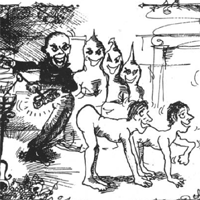
Like the Kennedys and the Rockefellers, the Walker Bush family belongs to an oligarchy that has largely shaped the last American century. Its predilection for crony capitalism and political racketeering goes back to the First World War when Ohio-based industrialist Samuel Prescott Bush (1863-1948) headed the War Industries Board’s small-arms, ammunition and ordnance section of the Wilson administration[1]. His eldest son Prescott Sheldon Bush (1895-1972) married the daughter of George Herbert Walker (1875-1953), a rich Missouri banker who was to make a fortune in Wall Street (fig. 1). Before World War II, the Walker Bush financial networks were involved in rearming Germany. As a director of private bank Brown Brothers Harriman (BBH), Prescott Bush was accused of treason in 1942, exonerated and then elected to the U.S. Senate in 1952[2].
A Short History of the Walker Bush Family
According to documents from the U.S. National Archives, publicized by The Guardian, BBH acted as an American financial support base for the German steel baron, Fritz Thyssen, who helped fund Hitler’s rise to power[3]. Prescott Bush and his father-in-law were founding members of Union Banking Corporation (UBC), a firm set up to represent Thyssen’s U.S. interests and part of a multinational network designed to move German funds around the world. In the fall of 1942, the shares and financial assets of UBC were seized by the Roosevelt administration under the Trading with the enemy Act as “property within the United States owned or controlled by nationals of a designated enemy country[4].”
Fig. 1: Dorothy and Prescott Bush, with George H. W., Barbara and Bush junior circa 1950. (George W.Bush presidential library)
Born in 1924, Prescott Bush’s second son, George Herbert Walker Bush, bears his maternal grandfather’s name. He would almost give the same name to his own son, George Walker Bush, a burdensome legacy for young “Georgie” as we shall see. George Herbert’s mother, Dorothy Walker Bush, an ex-tennis champion, instilled in her children an unquenchable thirst for competition, making up countless challenges to rank their performance. A very authoritarian character, his father Prescott Bush commanded that the boys wear ties and jackets to sit at the dinner table. A few months after the attack on Pearl Harbor (1941), as several of his dad’s German-connected business partners were probed by the U.S. Justice Department for collaboration with the enemy, George Herbert enlisted to save the family honor[5]. He was only 18 years old and would become the youngest pilot to fight in the U.S. Navy during World War II—a traumatic experience resulting in a severe psychological wound. After more than 50 combat missions in the Pacific Theatre, his Grumman Avenger was shot down over Chichi Jima (Japan) and both of his crewmen were killed in the plane crash (fig. 2). An unresolved grief would impact George Herbert Walker Bush’s psyche with further consequence for his first son’s presidential decision making, notably after 9/11.
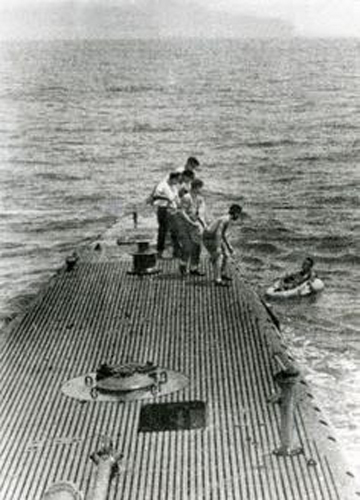
Fig. 2: George H. W. Bush rescued by USS Finback, with the Chichi Jima Island in the background. (http://worldwartwo.filminspector.com)
This brief biographical material shows how the personality of George Herbert Walker Bush was forged within a demanding family regime. Having grown up in a very performance-driven family, he excelled in playing baseball as well as in academics, and postponed his Yale education to “serve his country.” A decorated war hero, he suffered from what is often tagged Survivor Syndrome—a haunting guilt over not having been able to save his comrades and a terror of being condemned as incompetent. After his marriage to Barbara Pierce, George Herbert finally entered the prestigious Yale University like his father and grandfather before him. The campus was a thriving hub of activity in the wake of Victory Day as Barbara gave birth to their first child, George Walker Bush.
The Problem of Maternal Abuse
In the family narrative, Barbara Pierce Bush is portrayed as a good wife and mother. Reared in a bourgeois household on the East Coast, she claims to be a descendant of Franklin Pierce (1804-1869), the 14th US president. For the young bride with a deep sense of insecurity that was effectively forced into repression by a strict Protestant upbringing, and was intensified by the war years, the perpetual agitation at Yale offered a focus away from her inner anxieties that allowed her to cope. However, at a crucial time, when she became a mother, this undiagnosed anxiety disorder would have a daunting influence on her first son, born July 6, 1946, at a nearby hospital in New Haven (Connecticut). Revealingly, as sitting president in the aftermath of the 9/11 events, George W. Bush would champion an obsessive political crusade against terror. Indeed, as will be argued, such imprint and subsequent fear fueled by childrearing violence would be coped with by projecting his inner anxiety onto an external enemy.
As a child and teenager, Barbara was constantly belittled by her own mother, Pauline Robinson Pierce, who rebuked her for bad manners and mocked her for being overweight. She was ridiculed and teased in the Walker Bush family as well. Her fiancé’s older brother, Prescott Bush Jr., called her “Barsil”—an offensive allusion to the family carthorse’s name, which is how she got her nickname, Bar[6]. As she writes in A Memoir, Barbara was spanked by her mother, and as a result also hit her own children and was controlling of them as well:
“Mother did most of the scolding in the family. My brother Jimmy got the most spankings. Yes, my mother spanked us and pretty hard with either the back of a hairbrush or a wooden clothes hanger… I spanked my own children, but not as hard as my mother did[7].”
She would struggle throughout her life not to sink into depression. As her husband was entirely taken up with his business, Barbara became the real authority in the household and would be referred to as “The Enforcer.” When a conflict broke out between children, she would smack them bluntly and her eldest son, George W., would mention her unpredictable mood swings in one of his own autobiographies:
“Mother was the enforcer. She could get hot, and because we had such similar personalities, I knew how to light her fuse. I would smart off, and she would let me have it. If I was smutty, as she put it, I would get my mouth washed out with soap. That happened more than once[8].”
To suppress the fear that his mother inspired and ease the pain of emotional neglect, George Walker Bush forged a conscious image of motherly benevolence—a Little League Mom for instance[9]—while raging within at an abusive mother. “We both have tempers that can flare rapidly, Bush further writes. And we can be blunt, a trait that gets us in trouble from time to time.” Later in his youth, he would turn to alcohol, presumably to mitigate an inner state of depression that was left undiagnosed as well[10].
An Absent Father
Now we see how problems in the family are transmitted, from one generation to the next by means of interaction between parents and child. Upon graduating from Yale, his father said he wanted to “stand on his own feet” while heading for Texas with his wife and son. His mother believed that she was “devoting herself to her family” in following her husband during his numerous business trips.[11] But both mother and father were tormented by an insatiable thirst for approval and unable to provide their own children with the emotional awareness needed to grow into mature adults. Indeed, to meet internalized expectations and thrive into this new oil El Dorado, the Bushes moved five times in less than a year, while Barbara was pregnant with her second child.[12]
Shuttled back and forth to follow a rather restless father, little Georgie built a fantasy world around this unapproachable figure. In his earliest memories, he is sitting on the floor with his mother looking at family albums, with pictures of his father in the cabin of his Avenger, of his Navy officer father and his smiling bride, and dozens of traces of his father’s aerial feats. “My favorite part of the scrapbook was a piece of rubber from the raft that saved Dad’s life in the Pacific”, he would later write. “I never had to search for a role model. I was the son of George Bush[13].” He himself would become a National Guard pilot to avoid fighting in Vietnam, but would never live up to his father’s expectations (fig. 3).
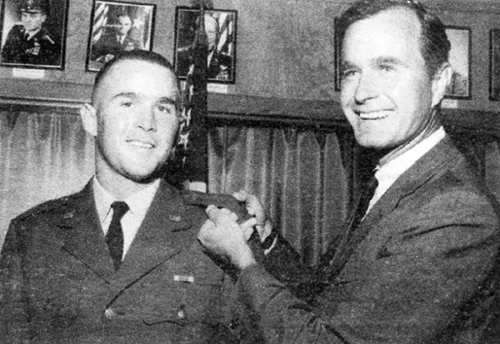
Fig. 3: George H. W. Bush displays his son George W. Bush’s officer’s bar
on his Texas Air National Guard uniform, circa 1968. (Getty images)
Actually, his mediocre academic and sporting achievements exacerbated the feeling of not being approved of by his father, so that he took on the role of a buffoon to attract attention. Using derision as a weapon, George W. kept at bay the fear of disappointing this overbearing man, who scolded his son by silence or by saying “I’m disappointed in you,” just as his own father had done with him. According to close relatives, this painful relationship is a key framework for understanding the psychology of George W. As his younger brother Marvin said: “He could be made to feel that he had committed the worst crime in history[14].” An amorphous sense of being at fault echoes his father’s guilty feeling after the Chichi Jima incident of being responsible for the death of his crewmen and failing to perform his mission.
This cumbersome legacy certainly contributed to the period of wandering that characterized the end of his studies at Yale where George W. tried to follow in his father’s footsteps. At the time, young Bush was well known for his dissoluteness and penchant for drinking, a substance dependence which seemed to mask a depressive personality.[15] He rarely gave any hint of his deep resentment. However, one night, driving back with brother Marvin after a few merry evening drinks, he ran the car into a garbage can and woke up his dad who angrily summoned the partiers. “I hear you are looking for me,” said a boisterous George W. “You wanna go mano a mano right here[16]?”
A Family Tragedy
In 1953, Georgie was seven years old when a tragedy occurred that would remain engraved as the first vivid memory of his childhood: the sickness and death of his younger sister, Robin. The Bushes had just moved into a new house and Barbara had given birth to her third child, John Ellis Bush, promptly nicknamed Jeb. Not long before, George Herbert had created a venture capital fund dedicated to buying and selling oil-drilling royalty rights for which his maternal uncle, Wall Street investor George Herbert Walker Jr., supplied $300,000 in start-up funds[17]. More loyal to the Walker Bush’s ambitions than to his own children, he developed a bleeding ulcer and spent even less time with them[18]. Little Robin was losing her health too: she frequently felt tired and showed surprising bruises on her body. The family doctor diagnosed leukemia, with little hope for a cure. In disbelief, the Bushes flew to New York with their daughter for a long series of tests and treatment at Memorial Sloan-Kettering hospital, but in vain.
Georgie, no longer allowed to play with his sister, was not informed of her illness or about the cause of her absence. On October 11, 1953, Robin died after a last-minute surgery in the presence of her parents, and her body, donated to science, was buried a few days later without a funeral. Did her father experience this loss as a form of punishment for his conduct during the war? Was the decision against a funeral unwittingly related to the death of his comrades in arms, who also died without a grave in the waters of Chichi Jima? Not until his parents’ return would Georgie be told the sad news, with again no alternative to the repression of sadness and grief for the seven-year-old. Given no opportunity to express despair at the loss of his younger sibling, the boy likely intensified his use of dissociation, repression and projection, all defense mechanisms which he already utilized. Most revealingly, this child who then repressed his emotions in response to parental inaccessibility, would hold the Presidency at a time of national mourning following the events of September 11, 2001. Apparently unable to come to terms with the tragedy and confront his own emotions, he would defend himself and the country by identifying with his father as warrior and by naming Osama Bin Laden as the target of a forthcoming revenge attack.
Indeed, what became of the child’s previously unexpressed hostility? How did he react when pushed away and anxiously left alone by a distant father and an inaccessible mother? In the absence of responsive parents, George W. most likely fostered a growing resentment. His playmates at the Sam Houston Elementary School in Midland (Texas) remember an overexcited and witty youngster they derisively referred to as Bush Tail by dint of watching him running away. Decades later, one of his young neighbors recalled Barbara grabbing Georgie by the ear and dragging him towards the bathroom to get his mouth soaped because of some dirty words[19]. He had felt cheated after Robin’s death his mother would later presume, but at the time she only thought of punishing him for what she judged as willful misconduct[20].
Childrearing Violence in the Electorate
Some children who are routinely subjected by adults to physical and psychological violence show their deep inner confusion in their play. “We were terrible to animals,” one of Georgie’s playmates recalled, laughing. “Ponds in the neighborhood would fill up with frogs after a heavy rain. Everybody would get BB guns and shoot them. Or we’d put firecrackers in the frogs and throw them and blow them up[21].” Through such play, the children were perhaps reacting to the aggression which they had been victims of and identifying with those who used violence against them. But instead of seeing such ruthless behavior as a mirror of their own brutality, parents silently confirmed the prevalence of male chauvinism over respect for life. Years later, some critics would detect in Governor George W. Bush a form of excitement when confirming a death sentence but would never make a link with the abuse to which he had been subjected. During a 2000 election debate with Democratic candidate Al Gore, for instance, the Republican nominee would affirm that the death penalty is the best possible way to prevent racial crime[22].
The prevalence of punitive public policies, such as support for the death penalty, appears to have had its source in childhood experiences of physical punishment, still enforced in many U.S. schools (fig. 4).
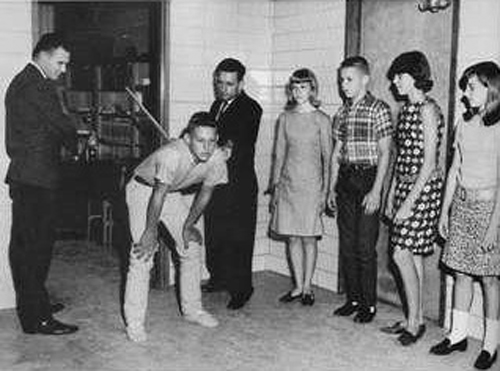
Fig. 4: Corporal punishment in an American school in the 1960s. 19 States still allow paddling today. (www.corpun.com)
Such violence has severe psychological and social side effects as evidenced by the vengeful tone of the political climate and often mean-spirited mood of the electorate. According to official figures reported by Human Rights Watch, 223,190 students nationwide received corporal punishment at least once in the 2006-2007 school year, including 49,197 students in Texas alone, the largest number of any state[23]. George W. Bush himself was subjected to such ordeals, as disclosed by former principal of Sam Houston Elementary School, John Bizilo, on the eve of the 2000 presidential election. He was about 10 years old and liked to play jokes after his sister passed away, so as to distract his family from their grief. One morning in the music class, he drew a beard and sideburns on his cheeks to imitate Elvis Presley and make his comrades laugh. His teacher grabbed him by the arm and marched him down to the principal’s office, where George was told to “bend over” and was given three “licks” on his bottom with a wooden paddle, by the principal. “When I hit him, he cried,” Mr. Bizilo recalled. “Oh, did he cry! He yelled as if he’d been shot. But he learned his lesson[24].”
The child found no consolation from his mother who backed the principal’s punishment and later argued:
“He hadn’t bruised him or he hadn’t hurt him. He’d only hurt his feelings… You don’t want the class clown, you want a kid who’s going to do his best… And I backed the principal[25].”
Here again, Barbara Bush showed no compassion for her child who, in his own way, expressed despair at his mother’s inaccessibility by clowning around. Aside from other routine aggressions on the part of his caretakers, this tragic episode would stay etched in the child’s mind as a demonstration that ritualized violence is one of the privileges of power. Maternal callousness would only aggravate George’s dissociation and chronic lack of empathy. Years later, a reporter would rightly state: “Many of the roots of Mr. Bush’s political philosophy as a presidential candidate—including his belief in tough love for juvenile offenders—seem to go back to his childhood [in] Midland[26].”
Hazing Practices at Yale
The influence of an idealized father figure was important for young Georgie. From his earliest years, he overidealized his father’s accomplishments. Just like George Herbert before him, George W. could only be loyal to the Walker Bush inheritance. “I think he wanted to do everything he could to be just like his dad,” an old friend recalled. “He wanted to play baseball just like his dad did, he wanted to go to Yale, just like his dad did… And his dad wanted him to[27].” His parents enrolled him in a private school in Houston (Texas), and subsequently in the Phillips Academy in Andover (Massachusetts), New England’s oldest boarding school and a model of discipline. Of course, George Herbert had preceded him in Andover where he had been distinguished: a portrait of the elder Bush in baseball apparel still hangs in one of the hallways. But in his autobiography, his son would write:
“Going to Andover was the hardest thing I did until I ran for president almost forty years later. I was behind the other students academically and had to study like mad. In my first year, the lights in our dorm rooms went out at ten o’clock, and many nights I stayed up reading by the hall light that shined under the door[28].”
Indeed, the teenager almost certainly suffered from undiagnosed dyslexia and had to cope with the anxiety of not being able to meet the family’s expectations. He resorted to his habitual defensive strategy: acting the clown to attract attention (fig. 5).
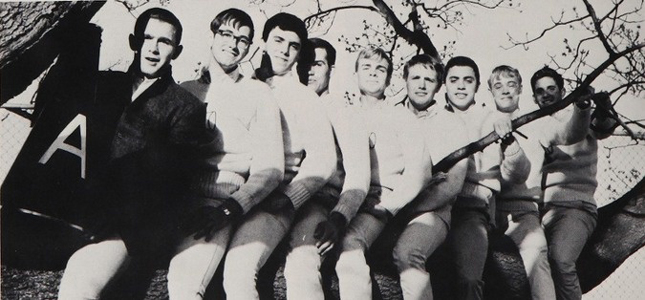
Fig. 5: Cheerleader and future president George W. Bush, in his 1964 "Pot Pourri" yearbook of Phillips Academy in Andover, Massachusetts. (www.pinterest.com)
One day during a football game in front of the entire student body, George W. stormed onto the field dressed as one of the Beatles, to everyone’s delight, just as he once did for his Elementary Midland classmates. “He rose to a certain prominence for no ostensible, visible reason,” a comrade would sum up. “He just didn’t let people get to know him[29]...” Young Bush’s amazing ability to remember names and faces, which helped clear the air of irritation by his jokes and boasting, was likely developed as a desperate reaction to his parents’ emotional callousness. Years later, as he was running for reelection as governor, they would confess that George W.’s “back-slapping, wisecracking, occasionally teasing style” went back to his childhood years, after Robin’s death, as he tried to ease their pain and draw some attention to his own grief[30].
At Yale, like his father and grandfather, George W. was a member of the enigmatic Skull & Bones society and Delta Kappa Epsilon fraternity (DKE), of which he became president. According to former Republican strategist Kevin Phillips, building relationships in the Ivy League institution helped create a network of influence “with a moral arrogance and backstage disregard of the democratic and republican traditions of the U.S. government[31].” When the Vietnam War protest movement sparked revolt on campuses in the 1960s, George W. favored the rabid anti-Communism of his father, then a Republican candidate for a U.S. Senate seat from Texas.
For George W., the culture at Yale created opportunities to re-enact the abusive behaviors he was subjected to in childhood, with a sense of impunity typical of powerful members of the social elite. In November 1967, the Yale Daily News reported that banned customs were still common in the fraternities. Initiation of new members involved degrading and sadistic rituals that fraternity members were reluctant to denounce. At DKE, the hazing lasted for a week and ended up with the branding of the Greek letter delta in the lower back of initiates, using a white-hot wire coat hanger. The New York Times published an interview of George W. Bush in which he described the resulting wound as “only a cigarette burn[32].” However, in 1999, the topic resurfaced and a faculty member, who experienced DKE hazing at around the same time, showed to the press the scar he still bore on his bottom. But the outrage would take a new significance when, in April 2008, president George W. Bush would express his approval of the torture inflicted on detainees in the War on Terror. Not surprisingly, some evoked the bullying rituals of fraternities at Yale and elsewhere (fig. 6).
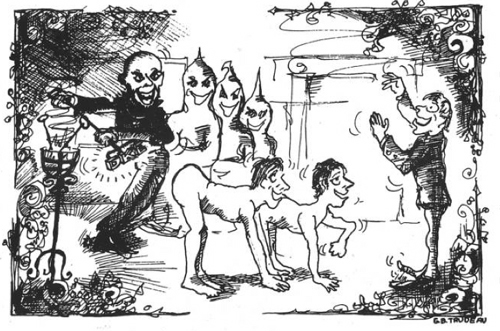
Fig. 6: Frat-Branded, Yale Daily News Friday No 4, November 3, 1967 (http://digital.library.yale.edu/).
Conversion of the Prodigal Son
Some of his bizarre behaviors, bordering on caricature, reveal a very insecure person hidden behind a smirking mask. At Harvard where he earned an MBA degree, Bush often sat in the back row wearing a bomber jacket and spitting chewing tobacco into a paper cup. His professor in macroeconomic policies and international business class at the time, Dr. Yoshi Tsurumi, would recollect a “very insecure, cunning and vengeful guy”:
“[Student Bush] showed pathological lying habits and was in denial when challenged on his prejudices and biases. He would even deny saying something he just said 30 seconds ago. He was famous for that[33].”
As the first oil crisis was raging, students were asked whether the most needy should be assisted with heating costs. Bush then said: “The government doesn’t have to help poor people—because they are lazy.” In a discussion of the New Deal, he denounced labor unions, Social Security and the Civil rights movement as socialism. “To him, socialism and communism were the same thing,” Dr. Tsurumi continued. “And when challenged to explain his prejudice, he could not defend his argument, either ideologically, polemically or academically.”
Following graduation, Bush decided to go back to Texas where a new oil boom was underway. Just like his father twenty-seven years earlier, he loaded a few belongings into his Oldsmobile Cutlass and drove across the country with a $20,000 fund supplied by the Walker Bush clan as a starting capital. But George W. didn’t live up to expectations. He created an oil company in which his father’s relatives invested three million dollars. A few years later, his decision to initiate a public offering resulted in a loss of one million dollars for his main shareholder.
In 1978, Bush lost his first electoral battle. The newcomer born with a silver spoon in his mouth was no match for a Democratic candidate who was rooted deep in the Texas political landscape. Loyal to his upbringing, the failed candidate would comment: “Frankly, getting whipped was probably a pretty good thing for me[34].” However, his biggest problem was his alcohol dependence. Despite his marriage to Laura Welsh Bush (1977) and the birth of their twin girls (1981), he spent a lot of time in bars where his habitual exuberance worsened after a few drinks.
But things took a decisive turn on the eve of his 40th birthday. Following a night of heavy drinking with his wife and friends in a luxurious hotel in Colorado Springs, he awoke with a raging headache, looked in the mirror and said: “Someday, I might embarrass my father. It might get my dad in trouble[35].” He told Laura that he would never drink again and confided the same intention to his close friends. Later on, the Bush clan would publicize a suitable version of the story—a romance that would be persuasive to the evangelical voters: that he had a redemptive encounter with Jesus Christ. According to a still later narrative, he became a born-again Christian after a memorable conversation with evangelical preacher Billy Graham. At the head of his father’s campaign team, he would promote “compassionate conservatism” as a means to seduce the Religious Right and help his father win presidency with the highest percentage of Evangelical voters in American history[36].
Paralyzed by Terror
As evidenced by Dr Justin Frank, George W. Bush’s conversion to Evangelical Christianity strengthened a personal tendency to act as judge and righter of wrongs[37]. He found refuge in prayer. A strict daily routine helped him cope with underlying emotional distress. This moral framework did not, however, prevent him from becoming involved in dubious business practices. A few months before his dad’s Operation Desert Storm in Iraq (1991), he sold all of his shares in Harken Energy, a drilling company working in the Persian Gulf: he received $848,560 and was briefly suspected of insider trading[38]. He then became a part owner of the Texas Rangers baseball team. In 1998, he sold his share of the team for $14.9 million—almost twenty-five times as much as his initial investment.
The disputed election 2000 was marked by a number of irregularities in Florida where brother Jeb was the governor. A Supreme Court decision gave him the election victory, despite a several hundred thousand vote lead in favor of his opponent Al Gore. For many Bush supporters, this election confirmed the return of God’s value system to the political arena after two successive Clinton terms—a Democratic president portrayed as the Antichrist by some evangelical congregations[39]—and came to crown the efforts made in reclaiming power after the humiliating Republican defeats in 1992 and 1996.
On his father’s advice, George W. picked Richard “Dick” Cheney as Vice President[40]—a man who embodied the greed and political nepotism that would prevail for years in Washington. Before becoming Vice President, he was the Chief executive officer of Halliburton, one of the world’s largest oil field services companies. Previously, he had been President Ford’s White House Chief of Staff, and later Secretary of Defense during the Presidency of George H. W. Bush where he helped plan the U.S. invasion of Panama (1989) and Operation Desert Storm in Iraq (1991).
On the morning of 9/11, when the first plane hit the North Tower of the World Trade Center, George W. Bush entered a Florida Elementary school to attend a reading exercise in a class of second-graders. Informed by his Chief of Staff that a second plane had just struck the South Tower, he carried on with the children, undisturbed—a shocking scene soon to be shown worldwide (fig. 7).
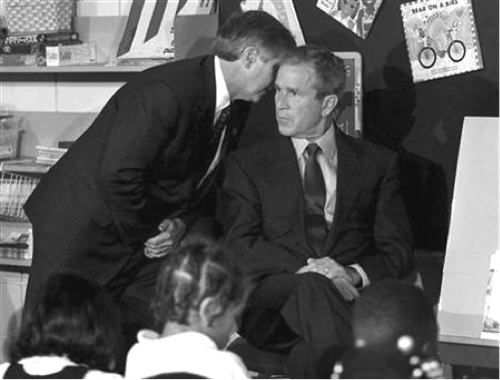
Fig. 7: President Bush, at Emma Booker Elementary School in Sarasota (Florida), as chief of staff Andrew Card informs him of a second attack on the WTC. (Win McNamee/Reuters)
One may wonder if this tragic event rekindled other traumatic memories, as when his parents announced the death of his younger sister. Most likely paralyzed by fear and unable to decide what to do next, he fled for an entire day, circling above the country in Air Force One. According to psychiatrist Justin Frank, “the attacks of 9/11 must have undermined Bush’s sense of omnipotence, recalling his early childhood feelings of humiliation and inadequacy[41].” Three days later, he would promise to “rid the world of terror[42].”
Unresolved Historical Legacy
George W. Bush’s intergenerational legacy of trauma was bound to influence his leadership. From that standpoint, the problems of the Bush dynasty bear strong affinities to that of the nation as a whole so that one could envisage this entire period of American history as a collective restaging. For many Americans, the emotional shock caused by these brutal attacks revived the lasting imprint of child abuse in their own lives.
In addition to corporal punishment which is still in use in many schools[43][44], many Americans have been subjected to spanking since the Supreme Court stated that such violence “serves important educational interests[45].” The use of terror tactics in childrearing is a tradition that is deeply engrained in American society. According to Jonathan Edwards, revivalist preacher of New England’s First Great Awakening (1730-1755), children were by nature “infinitely more hateful than vipers[46]” if they were not submissive to God. The new Religious Right rallied around this cultural heritage and still dominates Republican politics, notably through the Tea Party—a grass-roots conservative movement that, for some, evokes the nostalgia of colonial America. Televangelist Billy Graham, who advised every president since WWII, claimed that what he remembered most about his father was the feel of his hands against him: “They were like rawhide, bony, tough. He had such hard hands[47].”
Deploying the powerful American armed forces against the instigators of the terrorist attacks became—at least for many—a means to cope with the sense of powerlessness and vulnerability that engulfed them, while idealizing the President as a father figure.
Research shows that the victims of child abuse exhibit hyperactivity and impulsiveness when the original trauma is triggered by current circumstances. They frequently engage in patterns of behavior that are reminiscent of their first victimization, either in the role of the victim or that of the persecutor[48]. In the latter case, they are likely to participate in the restaging of abuse similar to the traumas to which they were subjected. The military operations launched in Afghanistan (2001) and Iraq (2003) provided numerous opportunities for restaging. In addition to the horrors of the war, there is a long list of crimes that were committed in the course of these conflicts. The detainee torture scandal is particularly revealing of how nations re-enact the consequence of repressed childrearing traumas.
The Point in Restaging Early Traumas
After 9/11, the fear of not doing enough to prevent another terror attack, as well as a wish for revenge, were at the heart of the controversial decisions of the Bush administration regarding the President’s Surveillance Program, the Enhanced Interrogation Techniques, the Guantanamo Bay detention camp and many others[49]. In February 2002, a secret presidential memorandum argued that the Geneva Conventions governing the Treatment of Prisoners of War did not apply to detainees of the war on terror. Later that year, the Office of Legal Counsel issued the infamous “torture memos” justifying the coercive methods the Pentagon would use against terror suspects secretly jailed outside the United States, such as mental and physical torment, prolonged sleep deprivation and waterboarding. These methods are reminiscent to the terror tactics used by the perpetrators of violence in education[50].
Before and during interrogation, soldiers were encouraged to vent their stress on detainees—for the most part “security internees” held without charge or trial[51]. One of the guards would explain: “... it was like a game. You know, how far could you make this guy go before he passes out or just collapses on you[52].” It turned out that in addition to combat exposure, most of these young soldiers had been subjected to a special training called SERE—for Survival, Evasion, Resistance and Escape—meant to reinforce their resilience when captured by the enemy[53]. This program, similar in all respects to the coercive interrogation techniques inflicted on detainees, “resemble[d] more of an elaborate hazing ritual than actual training” according to a former Marine and represented a real experience in torture[54]. The adverse consequences of such trauma are consistent with the emotional detachment some soldiers later showed as they re-enacted similar abuses and might explain the relative indifference that enabled torture tactics to spread from the top chain of command all the way down to the prisons of Bagram, Abu Ghraib and Guantanamo.
These episodes of acting out could have originated in an intergenerational transmission of violence that has become a cultural trait in this country. Indeed, a significant proportion of Americans have expressed support for the torture program as necessary to gain important information for national security. Among them, white evangelists in the South were “significantly more likely to rely on life experiences and common sense (44%) than Christian teachings of beliefs (28%) when thinking about the acceptability of torture[55].” Keeping in mind that Southern Evangelicals are strong supporters of corporal discipline, it can be inferred that the notion of “common sense” pertains to their traumatic recollection of punishment and is likely to endorse torture as a means of retaliation.
Thus a large majority of Americans joined with their leaders, foremost among them George W. Bush, in their inner urge to restage old terrors stemming from childhood. In a nation gripped by fear or even paranoia, the brutality of an early education imposed on youth became visible. In my view, this is likely to make sense of all victimizing situations and collective re-enactments: providing a growing awareness of the need to respect children and teenagers, if we are to live in a more peaceful world.
Marc-André Cotton*
© M.A. Cotton – 2016.07 / regardconscient.net
*Marc-André Cotton, MA, the President of the International Psychohistorical Association, and an International Member of the Psychohistory Forum, is a teacher, independent scholar, and director of the French website Regard conscient, dedicated to exploring the unconscious motivations of human behavior. He authored the French psychohistorical book Au Nom du père, les années Bush et l’héritage de la violence éducative published in 2014 by L’Instant présent (Paris).
Notes :
[1] Kevin Phillips, “World War I and the Bush Family”, in American Dynasty: Aristocracy, Fortune and the Politics of Deceit in the House of Bush, Penguin Books, 2004, 183-185.
[2] On Prescott Bush’s German embroilments, read Kevin Phillips, ibid, 38-39.
[3] Ben Aris and Duncan Campbell, “How Bush’w grandfather helped Hitler’s rise to power”, The Guardian, September 25, 2004.
[4] “Vesting Order No 248”, Federal Register, November 7, 1942, p. 9097.
[5] According to Intelligence community sources quoted by John Loftus, The Secret War Against the Jews: How Western Espionage Betrayed the Jewish People, St-Martin’s Griffin, 1997, 360.
[6] Barbara Bush, A Memoir, Lisa Drew Books, 1994, 19.
[7] Ibid., 10.
[8] George W. Bush, Decision points, Crown, 2012, 16.
[9] In the 1950s, Barbara Bush “was the leading light in Junior League and the Midland Service League” according to biographer Bill Minutaglio. First Son, George W. Bush and the Bush Family Dynasty, Three Rivers Press, 1999, 37.
[10] As evidenced by Dr Justin Frank, “Message in the Bottle”, in Bush on the Couch: Inside the Mind of the President, ReganBooks, 2004, 37-51.
[11] “I had every opportunity to finish my education, both then and in later years”, Barbara Bush would confide. “But I chose, instead, to have a big family.” Barbara Bush, A Memoir, op. cit., 26.
[12] Barbara Bush recalls their numerous relocations in A Memoir, op. cit., 35-38.
[13] George W. Bush, Decision Points, op. cit., 4.
[14] Quoted by Laurence I. Barrett, “Junior Is His Own Bush Now: George W. Bush”, Time.com, July 31, 1989.
[15] Bush recognizes his alcohol dependency in his autobiography, Decision Points, page 1, where he states: “I went on racking my memory for a single dry day over the past few weeks: then the past month; then longer. I could not remember one. Drinking had become a habit.”
[16] Bill Minutaglio, First Son, George W. Bush and the Bush Family Dynasty, Three Rivers Press, 1999, 148.
[17] Ibid, 35.
[18] His Texan doctor told him: “George, you’re a classic ulcer type. A young businessman with only one speed, all-out. You try to do too much and you worry too much.” George Herbert Bush, Looking Forward, Doubleday, 1987, 11-12.
[19] According to Michael Proctor, quoted by Nicholas D. Kristof, “A Philosophy with Roots in Conservative Texas Soil”, The New York Times, May 21, 2000.
[20] Barbara Bush will later admit: “You have to remember that children grieve. At first, George Junior couldn’t believe that [Robin] had died and was buried. He felt cheated. I’m not sure George and I handled that as well as we should have.” Amy Cunningham, “Good-bye to Robin”, Texas Monthly, Vol. 16, No 2, February 1988, 82.
[21] Terry Throckmorton, quoted by Nicholas D. Kristof, op. cit.
[22] George W. Bush, interviewed by Jim Lehrer, “The Second Presidential Debate”, Online NewsHour, October 11, 2000. Bush said: “And guess what? The three men who murdered James Byrd, guess what's going to happen to them? They're going to be put to death. A jury found them guilty. And I -- it's going to be hard to punish them any worse after they get put to death. And it's the right cause, so it's the right decision.”
[23] Human Rights Watch, A Violent Education, Corporal Punishment of Children in US Public Schools, August 2008 Report, 3,. The actual numbers are higher as many instances of the practice are not officially recorded.
[24] John Bizilo, quoted by Nicholas D. Kristof, op. cit.
[25] Barbara Bush, interviewed by Pamela Kilian, Barbara Bush: Matriarch of a Dynasty, Thorndike Press, 2003, 41.
[26] Nicholas D. Kristof, op. cit.
[27] Peter Neumann, interviewed by Bill Minutaglio, op. cit., 69.
[28] Decision Points, op. cit., 11.
[29] Bill Semple, interviewed by Bill Minutaglio, op. cit., 62-63.
[30] James Hatfield, Fortunate Son: George W. Bush and the Making of an American President, St-Martin Press, 1999, 15.
[31] Kevin Phillips, American Dynasty, Penguin Books, 2004, vii.
[32] George W. Bush, quoted by Scott Horton, “Branding Rite Laid to Yale University”, The New York Times, November 8, 1967.
[33] Yoshi Tsurumi, interviewed by Mary Jacoby, “The Dunce”, Salon, September 17, 2004.
[34] George W. Bush, quoted by Diane Reischel, “George W. Bush: Politics, Baseball and Life in the Shadow of the White House, Dallas Morning News, February 25, 1990.
[35] Joe O’Neill, interviewed by Bill Minutaglio, op. cit., 210.
[36] According to Doug Wead, interviewed by Raney Aronson for the documentary “The Jesus Factor”, Frontline, November 18, 2003. See also Doug Wead, “The History of the evangelical vote in presidential elections”, Doug Wead The Blog, September 11, 2008.
[37] Justin Frank, “In God I Trust”, in Bush on the Couch, op. cit., 53-76.
[38] Mike Allen, “Files: Bush Knew Firm’s Plight Before Stock Sale”, The Washington Post, July 21, 2002.
[39] Notably for his sponsoring of the Oslo Peace Agreement between Israelis and Palestinians, in September 1993. “Bill Clinton Sets the Pattern of Antichrist”, in The Church of Jesus Christ, October 1, 2009 update.
[40] According to Kevin Phillips, American Dynasty: Aristocracy, Fortune and the Politics of Deceit in the House of Bush, Penguin Books, 2004, 92-95.
[41] Justin Frank, Bush on the Couch: Inside the Mind of the President, ReganBooks, 2004, 99.
[42] George W. Bush, “National Day of Prayer and Remembrance for the Victims of the Terrorist Attacks on September 11, 2001”, September 14, 2001.
[43] Human Rights Watch, A Violent Education, Corporal Punishment of Children in US Public Schools, op. cit.
[44] Murray A. Straus, Beating the Devil out of Them: Corporal Punishment in American Families, Lexington Books, 1994, p. 23.
[45] U.S. Supreme Court, Ingraham vs Wright, 97 S. Ct. 1401 (1977), page 430 U.S. 657.
[46] Jonathan Edwards, “Thoughts on the Revival of Religion in New England” (1742), in Edwards on Revivals, Dunning & Spalding, 1832, 242.
[47] Marshall Frady, Billy Graham: A Parable of American Righteousness, Little, Brown & Co, 1979, 49.
[48] Bessel A. van der Kolk, “The Compulsion to Repeat the Trauma“, Psychiatric Clinics of North America, Vol. 12, No 2, 389-411, June 1989.
[49] Jack Goldsmith, The Terror Presidency, W. W. Norton & Co, 2007, 12.
[50] Adam Zagorin and Michael Duffy, “Inside the Interrogation of Detainee 063”, Time, June 20, 2005.
[51] Amnesty International, Beyond Abu Ghraib: Detention and torture in Iraq, March 2006, 39.
[52] American officer interviewed by Human Rights Watch, Leadership Failure: Firsthand Accounts of Tortures of Iraqi Detainees by the U.S. Army’s 82nd Airborne Division, September 2005, Vol. 17, No 3, 9.
[53] Established by the U.S. Air Force at the end of the Korean War, the SERE program was extended during the Vietnam War to the U.S. Army, U.S. Navy, and U.S. Marine Corps. For an extensive study of its psychohistorical implications, see Marc-André Cotton, “Poisonous Pedagogy: The Contentious Drift of Psychology”, The Journal of Psychohistory, Vol. 40, No 4, Spring 2013.
[54] David J. Morris, “Cancel Water-Boarding 101”, Slate, January 29, 2009.
[55] Robert P. Jones, “New Poll of White Evangelicals Shows Faith, Golden Rule Influence Attitudes on Torture”, Progressive & Religious, September 12, 2008.
